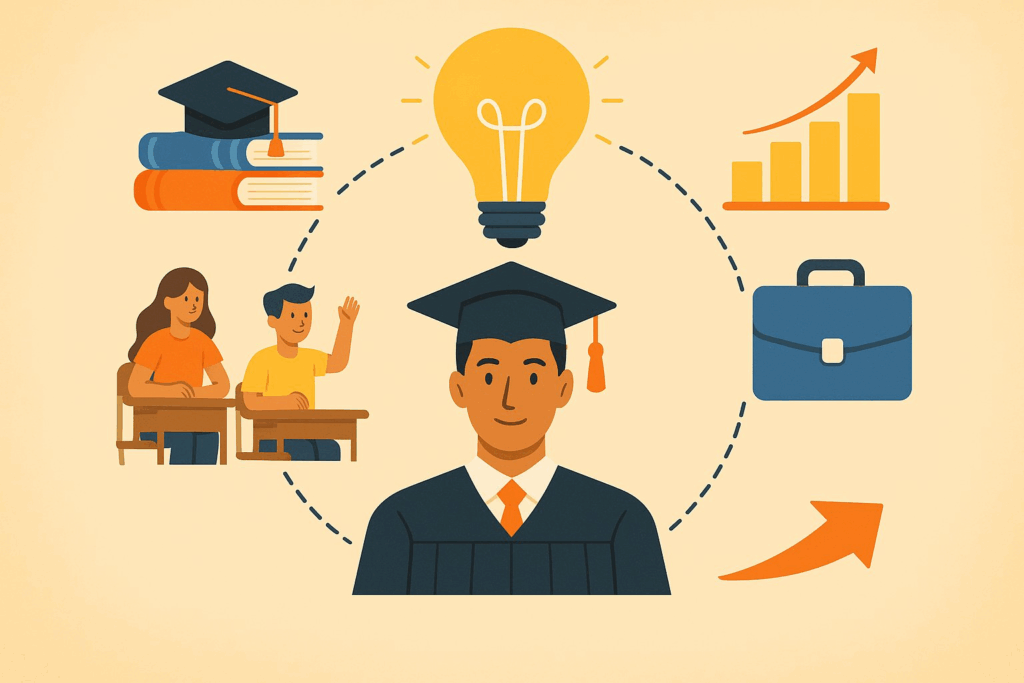
Education is the key to the advancement of individual personalities, society and the nation as a whole. The knowledge acquired can be applied in various real-life situations to overcome challenges. Education influences innovation and creativity.
This blog delves into the meaning of human capital, the role of education in human capital formation and socioeconomic development.
Understanding Human Capital Formation
Definition of Human Capital
Human capital is the measure of an individual’s knowledge, skills, abilities and experience. It is an intangible asset of a person that helps him/her land a job or gain opportunities. It includes training, health and education that contribute to the economic productivity of individuals and an organisation. This collective knowledge and skills in an institution improve efficiency and performance, prompting economic growth.
Role of Education in Enhancing Skills
Education plays a vital role in developing specific skills and competencies required in the workforce by imparting fundamental skills like writing, reading and arithmetic calculations. It fosters critical thinking, problem solving and decision-making skills. Individuals develop essential life skills like communication, collaboration, and perseverance through education.
Education as an Investment in Human Capital
Long-Term Economic Growth
Apart from equipping students with basic literacy and numeracy skills, education enables you to acquire specialised skills and knowledge that can be tailored to meet the needs of specific domains and professions.
Vocational training and technical education nurture an employable, skilled and productive workforce. Education is an investment that yields sustained economic growth through a well-educated population.
Human capital increases the productivity of a country and makes it globally competitive. It attracts foreign investments that contribute to increased growth and productivity.
Reducing Income Inequality
Education is a weapon that has the power to bring any person out of poverty. It provides equal opportunities for all. It empowers individuals to aim high and dream big. People gain access to find jobs, acquire new skills, and improve their overall quality of life.
Individuals with high levels of education gain the perk of landing high-paying jobs. Thus, education has the potential to bridge the gap between rich and poor. It leads to wealth distribution and reduces income inequality.
Education’s Role in Social and Economic Development
Empowerment Through Knowledge
- Education broadens perspectives and encourages thinking from multiple dimensions.
- It imparts rational thinking, logical reasoning, and critical analytical skills.
- It breaks the economic and social barriers and facilitates individuals to rise above all stereotypes.
- When educated people participate in lawmaking and governance, it leads to progress in society and the economy.
- Knowledge places a person in a position to make informed choices for self-growth and development of the organisation.
- A skilled workforce reduces poverty, promotes equality, and improves health.
- The socio-economic status of individuals can be altered with education.
Innovation and Technological Advancement
- Education imparts technical and specialised skills that foster innovation.
- It promotes critical thinking and reasoning skills that facilitate problem solving and finding solutions to complex issues.
- Higher education encourages students to pursue research and development, leading to technological advancements.
- Students acquire skills that help them navigate any problem in their professions and bring out originality.
- Educated individuals develop the ability to adapt to the evolving technologies and promote the application of these technologies.
- Teamwork of skilled individuals leads to breakthroughs in Science and Technology.
Challenges in Human Capital Formation Through Education
- There is a mismatch between the availability of resources and population. It demands increased investment.
- Human capital formation is a time-consuming process. Hence, it takes a long time to raise a skilled workforce.
- Regional and gender disparity hinder human capital development.
- The increasing costs of quality education put the poor in a disadvantaged position because of the unaffordability.
- The outdated curriculum, which does not align with the demands in the modern job market.
- Migration of educated people to urban areas or foreign countries adversely effects the economic development of the country.
Conclusion
Education empowers an individual and helps them realise their full potential. Education is beneficial not just for personal advancement but it also shapes the human capital in a nation, which contributes to economic prosperity. It also plays an essential role in building a strong, capable workforce for the future. The government has to increase the investment in the education sector and update the curriculum frequently to match the evolving needs of the job market.Also read: Best Educational Institute in Bangalore.
Education builds not just careers, but economies. To explore its broader impact, check out Why Is Education Important in Our Life?, how skills are shaped through Vocational Education, how early foundations matter via Secondary Education, and the financial pathways in Scholarships and How They Work. A well-educated population is the backbone of growth.
Frequently Asked Questions (FAQs)
How does Education Contribute to Human Capital Formation?
Education prepares students to become productive by imparting necessary skills and knowledge. People become employable by acquiring vocational training and technical proficiency. This leads to improved economic advancement.
What is the Significance of Investing in Education for Economic Growth?
Investing in education has long-term benefits for economic growth, as it produces a skilled workforce that contributes to economic prosperity. It attracts investments and fosters creativity and innovation.
How does Education Help in Reducing Income Inequality?
Education provides equal opportunity for all, regardless of gender and economic status. Highly skilled people can acquire high-paying jobs, gain access to a wide range of opportunities and come out of poverty. Education leads to wealth distribution, reducing economic inequalities.
What Challenges Exist in Using Education for Human Capital Formation?
Factors like population explosion, limited resources, high costs of quality education, migration of skilled people, and outdated curriculum pose a serious challenge in the human capital formation.

